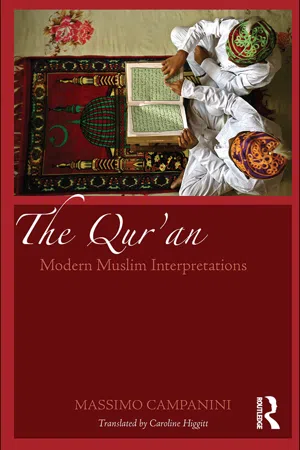
- 154 pages
- English
- ePUB (mobile friendly)
- Available on iOS & Android
About This Book
The Qur'an: Modern Muslim Interpretations offers a lucid guide to how Muslims have read the Qur'an in the twentieth and twenty-first centuries. Massimo Campanini explores early approaches to the understanding of the Qur'an, including that of the Salafis and the construction of the Islamic Renaissance Movement, contrasting the development of traditionalist and 'scientific' interpretations and examining the work of the phenomenologists who followed. This lively book explores the radical ideas of Sayyid Qutb and his followers, a significant part of what is known as political Islamism, and investigates the idea of exegesis as a liberation theology, through the work of Esack and Wadud.
Students taking courses on the interpretation of the Qur'an will find this an invaluable aid to their study, and it is essential reading for all those interested in how Muslims have understood the Qur'an in the contemporary period.
Frequently asked questions
Information
Chapter 1
Traditional commentary
SALAFI COMMENTARY
1


Table of contents
- Contents
- Translator’s introduction
- Introduction: The Qur’an and praxis
- Chapter 1 Traditional commentary
- Chapter 2 The Qur’an as text, discourse and structure
- Chapter 3 Radical exegesis of the Qur’an
- Chapter 4 The Qur’an and the hermeneutics of liberation
- Appendix Other areas of Qur’anic exegesis
- Notes
- Index